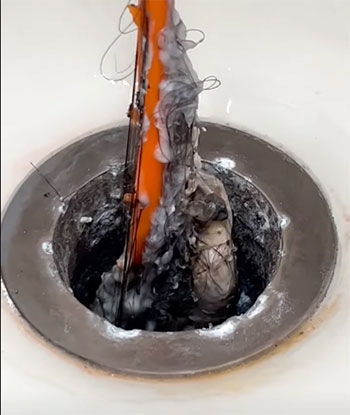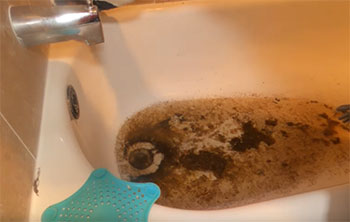Have you ever stepped into the shower, only to find yourself ankle-deep in water? Or perhaps you’ve attempted to drain the tub after a relaxing soak, but the water just won’t budge? If you’ve encountered these frustrating situations, you’re not alone. A clogged or slow-draining tub is a common household issue that can be caused by various factors, ranging from hair buildup to more complex plumbing problems.
In this comprehensive guide, we’ll delve into the most common reasons why your tub isn’t draining properly and provide you with practical solutions to get that water flowing smoothly again. Buckle up, because we’re about to take you on a journey through the plumbing world, where clogs and blockages are no match for our expertise.
The Hairy Situation: Hair and Soap Scum

One of the most prevalent culprits behind a clogged tub drain is hair. Whether it’s your luscious locks or your furry friend’s shedding, strands of hair can quickly accumulate in the drain, forming a tangled mess that prevents water from escaping. Combine that with soap scum, and you’ve got a recipe for a serious clog.
To tackle this hairy situation, start by removing the drain cover and using a sink plunger or a simple drain snake to dislodge the clog. If that doesn’t work, it’s time to bring in the big guns: a drain auger or a chemical drain cleaner. However, be cautious when using chemical cleaners, as they can be harsh on pipes and the environment.
The Gunk and Grime Grind
Over time, various substances can accumulate in your tub drain, causing a buildup of gunk and grime. From soap residue and shampoo remnants to mineral deposits and even small toys (yes, we’ve seen it all), these blockages can slow down or completely stop the flow of water.
To combat this issue, start by trying a good old-fashioned baking soda and vinegar mixture. Pour a generous amount of baking soda down the drain, followed by vinegar. Let the fizzy reaction work its magic for a few minutes, then flush the drain with hot water. If that doesn’t do the trick, it’s time to call in a professional plumber to assess the situation and potentially use more heavy-duty equipment, like a hydro-jetter or a cable auger.
The Elusive Plumbing Mysteries
Sometimes, the issue with your tub not draining properly can be attributed to more complex plumbing problems. These can include cracked or corroded pipes, a malfunctioning vent system, or even a main sewer line blockage.
If you’ve tried all the DIY methods and the clog persists, it’s crucial to seek the expertise of a licensed plumber. They have the tools and knowledge to diagnose and resolve these elusive plumbing mysteries, ensuring that your tub drains efficiently and preventing any potential water damage or costly repairs down the line.
The Low-Flow Showdown

In some cases, your tub may be draining, but at a frustratingly slow pace. This low-flow situation can be caused by various factors, including partial clogs, improper plumbing installation, or even a faulty drain stopper mechanism.
To address this issue, start by checking the drain stopper for any debris or obstructions. If that’s not the culprit, try using a plumber’s snake or a drain auger to clear any partial blockages. If the problem persists, it’s time to call in a professional plumber to inspect the plumbing system and identify any potential issues with the drain pipes or vent system.
FAQs: Your Tub Draining Queries Answered
To fix a bathtub that won’t drain, start by trying simple DIY methods like using a plunger or a drain snake to dislodge any clogs. If that doesn’t work, you can try a baking soda and vinegar mixture or a chemical drain cleaner. If the issue persists, it’s best to call a professional plumber to assess the situation and use more heavy-duty equipment or repair any underlying plumbing issues.
If your bathtub has standing water and won’t drain, start by removing as much water as possible using a cup or a wet/dry vacuum. Then, try using a plunger or a drain snake to dislodge the clog. If that doesn’t work, you can try a baking soda and vinegar mixture or a chemical drain cleaner. If the issue persists, it’s best to call a professional plumber to assess the situation and use more heavy-duty equipment or repair any underlying plumbing issues.
To unclog your bathtub drain, start by trying simple DIY methods like using a plunger or a drain snake to dislodge any clogs. If that doesn’t work, you can try a baking soda and vinegar mixture or a chemical drain cleaner. If the issue persists, it’s best to call a professional plumber to assess the situation and use more heavy-duty equipment or repair any underlying plumbing issues.
There could be several reasons why your tub suddenly stopped draining. It could be due to a buildup of hair, soap scum, or other debris in the drain, causing a clog. It could also be due to more complex plumbing issues like cracked or corroded pipes, a malfunctioning vent system, or a main sewer line blockage. In some cases, it could be due to a faulty drain stopper mechanism or improper plumbing installation.
Conclusion: Don’t Let a Clogged Tub Dampen Your Spirits
A clogged or slow-draining tub can be a frustrating and even unsanitary issue, but with the right knowledge and approach, it’s a problem that can be tackled head-on. Whether it’s a simple hairball clog or a more complex plumbing mystery, this guide has armed you with the tools and information necessary to get that water flowing smoothly again.
Remember, prevention is key. Regularly cleaning your tub drain and using hair traps or drain covers can go a long way in avoiding future clogs. And when in doubt, don’t hesitate to call in a professional plumber – their expertise can save you time, money, and a whole lot of headaches in the long run.
So, the next time you find yourself wading through a puddle in your tub, take a deep breath and embrace the challenge. With a little elbow grease, some DIY know-how, and a dash of humor, you’ll be back to enjoying those relaxing soaks or invigorating showers in no time.
